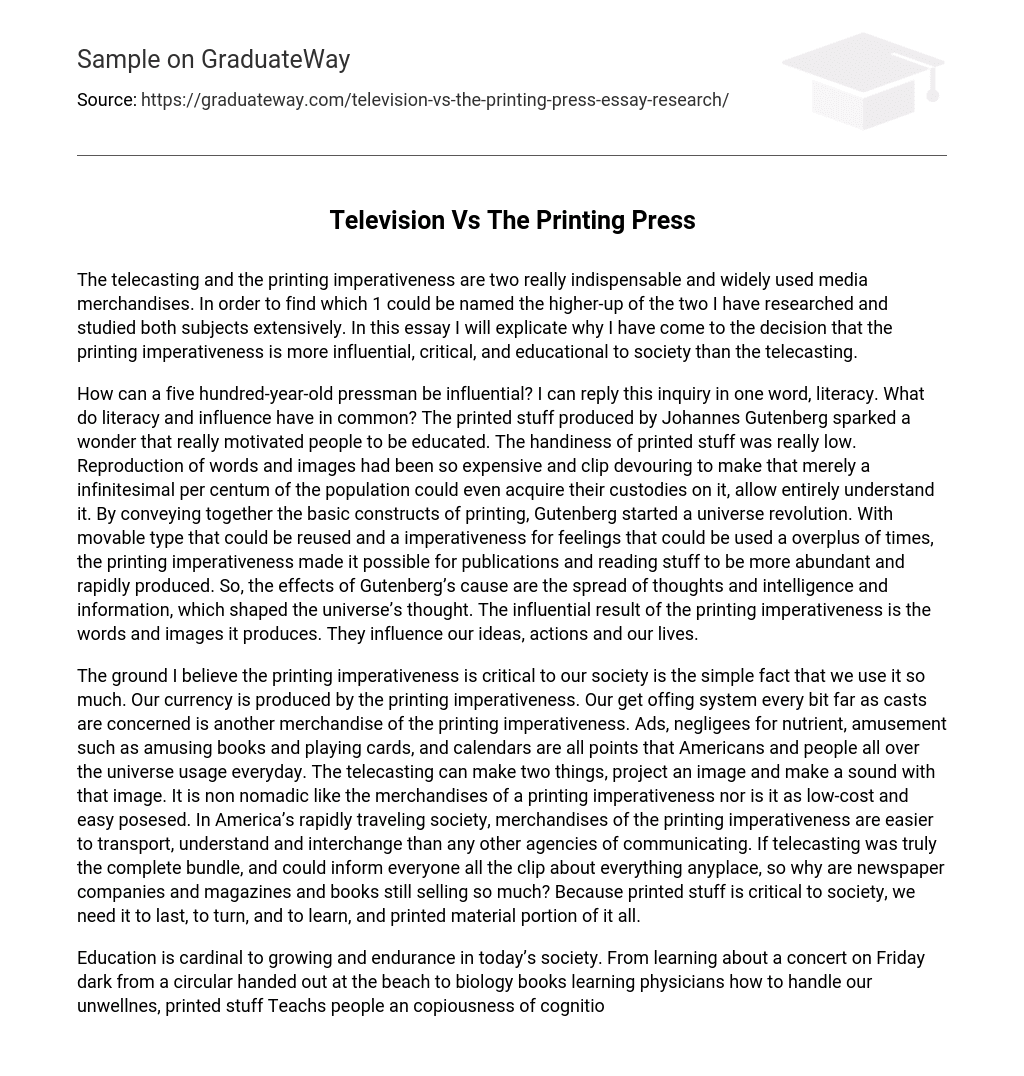The telecasting and the printing imperativeness are two really indispensable and widely used media merchandises. In order to find which 1 could be named the higher-up of the two I have researched and studied both subjects extensively. In this essay I will explicate why I have come to the decision that the printing imperativeness is more influential, critical, and educational to society than the telecasting.
How can a five hundred-year-old pressman be influential? I can reply this inquiry in one word, literacy. What do literacy and influence have in common? The printed stuff produced by Johannes Gutenberg sparked a wonder that really motivated people to be educated. The handiness of printed stuff was really low. Reproduction of words and images had been so expensive and clip devouring to make that merely a infinitesimal per centum of the population could even acquire their custodies on it, allow entirely understand it. By conveying together the basic constructs of printing, Gutenberg started a universe revolution. With movable type that could be reused and a imperativeness for feelings that could be used a overplus of times, the printing imperativeness made it possible for publications and reading stuff to be more abundant and rapidly produced. So, the effects of Gutenberg’s cause are the spread of thoughts and intelligence and information, which shaped the universe’s thought. The influential result of the printing imperativeness is the words and images it produces. They influence our ideas, actions and our lives.
The ground I believe the printing imperativeness is critical to our society is the simple fact that we use it so much. Our currency is produced by the printing imperativeness. Our get offing system every bit far as casts are concerned is another merchandise of the printing imperativeness. Ads, negligees for nutrient, amusement such as amusing books and playing cards, and calendars are all points that Americans and people all over the universe usage everyday. The telecasting can make two things, project an image and make a sound with that image. It is non nomadic like the merchandises of a printing imperativeness nor is it as low-cost and easy posesed. In America’s rapidly traveling society, merchandises of the printing imperativeness are easier to transport, understand and interchange than any other agencies of communicating. If telecasting was truly the complete bundle, and could inform everyone all the clip about everything anyplace, so why are newspaper companies and magazines and books still selling so much? Because printed stuff is critical to society, we need it to last, to turn, and to learn, and printed material portion of it all.
Education is cardinal to growing and endurance in today’s society. From learning about a concert on Friday dark from a circular handed out at the beach to biology books learning physicians how to handle our unwellnes, printed stuff Teachs people an copiousness of cognition. Regardless of importance, it informs. Printed stuff made by the printing imperativeness contributes to the enrichment of persons believing. The libraries that are in most all communities’ keep more cognition than one human being could absorb in a life clip. Television does non ever have a plan that is informing on a topic of which you would wish more cognition on, hence books and magazines are a better beginning of information and amusement.
Overall, I believe that telecasting is a lazy adult male’s newspaper and is more recognized by society than merchandises of the printing imperativeness. Never the less, hoardings, money, casts and church booklets are points that could non be abandoned from our lives. Printing imperativeness merchandises are more low-cost, easy distributed and copied for the convenience of all people, non merely those who can afford telecasting sets and overseas telegram, and places to set them in, but everyone. The bible and school text editions are used and read mundane 1000000s of times by 1000000s of people, you can’t do that with a telecasting. John F. Kennedy called telecasting “a huge barren”. I can’t assist but believe that he would he would grin and hold with my sentiment stated in this essay.
References
- Compton’s Interactive Encyclopedia Deluxe. 1994-1997
- The Encyclopedia Americana, International Edition volume 22.1996
- World Book Encyclopedia volume 15. 1993
- A Short History of the Printed Word by Warren Chappell. 1980
- The Book Before Printing by David Diringer. 1983
- Books: From Writer to Reader by Howard Greenfeld. 1978





